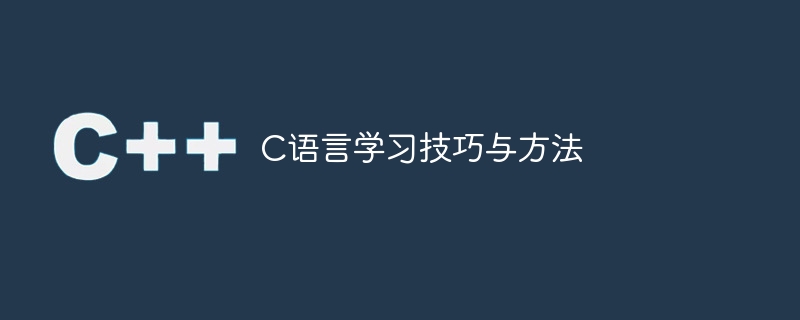
C language is a programming language widely used in the field of computer science. It has the characteristics of structure, efficiency and portability. For beginners, learning C language can be somewhat challenging. This article will introduce some techniques and methods that can help improve the effectiveness of C language learning.
- Understand the basics
Before learning C language, it is very important to understand some basic computer science concepts. This includes variables, data types, operators, flow control statements, etc. By learning these basic knowledge, it is easier to understand and apply various concepts and syntax of C language.
- Read classic textbooks
Choosing an authoritative and easy-to-understand C language textbook is the key to learning. Classic textbooks such as "C Primer Plus" and "C Programming Language" are good choices. These textbooks systematically introduce the basic knowledge and skills of C language, and provide a wealth of examples and exercises to help deepen your understanding of C language.
- Hands-on practice
The most important thing about learning a programming language is to practice. By writing simple programs to test and consolidate the knowledge you have learned, you can better understand and master the syntax and usage of C language. During the practice process, you can try different programming styles and techniques to gradually improve your programming abilities.
- In-depth understanding of pointers
Pointers are a very important concept in C language, which may be difficult for beginners to understand. Clarifying the definition and use of pointers is the key to improving the effectiveness of C language learning. Through a lot of exercises and practice, you can gradually master the skills of using pointers, and gain an in-depth understanding of the application of pointers in memory management and data structures.
- Question-taking to improve
Question-taking is an effective way to learn C language. You can choose some classic programming problems and write code to solve them. In the process of solving problems, you can think about and try different solutions, thereby improving your programming thinking and problem-solving abilities. In addition, reviewing questions can also help consolidate the knowledge you have learned, and it is also very helpful in preparing for interviews.
- Participate in open source projects
Participating in open source projects is a very good way to learn C language. By participating in open source projects, you can communicate and collaborate with other developers and learn from their programming skills and experience. In addition, you can be exposed to actual programming problems and challenges in open source projects, which will help improve your practical abilities.
- Learn debugging skills
In the process of writing code, you often encounter various errors. Learning and mastering debugging skills can help locate and solve problems quickly. You can use a debugger to trace the execution of a program, view the values of variables and memory status, so you can find the cause of errors and fix the code.
To sum up, learning C language requires mastering basic knowledge, reading classic textbooks, practicing, in-depth understanding of pointers, improving by answering questions, participating in open source projects and learning debugging skills. These techniques and methods will help beginners learn and apply C language more efficiently and lay a solid foundation for future programming learning.
The above is the detailed content of C language learning skills and methods. For more information, please follow other related articles on the PHP Chinese website!






